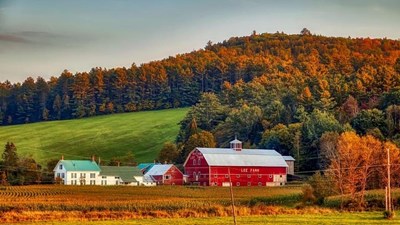
Vermont’s Governor has made “economic growth” his highest priority. Vermonters should consider whether “economic growth” is a value worth sacrificing our communities and our culture for.
Vermont’s past has been agricultural; and that is its future. Governor Scott insists that our state needs more young workers, to fortify our sagging tax base and create a foundation of future earners to support services for our aging population. His plan is to use government to expand manufacturing and other business. In a recent essay the Governor claimed:
...we succeeded in investing more in economic growth, including marketing Vermont as a place to do business, expanding small business development centers, and establishing tax credits that will support our growing aerospace sector and the forest products economy as well as the creation of new co-working and “maker” spaces that nurture small, innovative startup businesses.
Our Governor is doubtless well-intentioned, but peddling Vermont as a “place to do business” to attract people who aren’t from here is destructive to our unique culture, whether or not it “creates jobs.” We are increasingly dependent on out-of-state tourism, and our landscape and natural resources have been repeatedly scarred by long-gone corporations that “created jobs” for a while before leaving us their PFOA’s, abandoned mines, suburban sprawl and commuter pollution. Touting Vermont’s “growing aerospace sector” while never mentioning agriculture at all, Governor Scott reflects the failed “business” thinking that has destroyed our communities, farms, and waterways by elevating profits above basic community values. These commercial forces have decimated Vermont economically, and now they are embraced as the panacea that will rescue us from our industrialized plight. As Wendell Berry cautioned in 1977: “As the householder evolves into a consumer, the farm evolves into a factory -- with results that are potentially calamitous for both.” (The Unsettling of America).
Enamored with modern conveniences and technological gimmickry, most Vermonters long ago “evolved into consumers,” and the crisis in our milk ‘industry’ affirms Mr. Berry’s prophetic precision -- our farms have become factories. Do we really think there is no price to be paid for this transition? More terrifying, do we really wish to double down and create yet more factories in the Green Mountains? Maybe we should “market” ourselves as the future Detroit.
The problem with capitalism is that it requires not steady but increasing growth to continue. Thus we have bubbles, artificially postponed with debt. To avoid recession, we must always have more jobs -- never a reduction -- no matter how much we pollute, pave, or consume. Yet we live in a universe of limited resources. (Only labor seems now to be essentially limitless, such that real wages will continue to shrivel). Our current economy is sort of like a wood stove that required 10% more wood every winter to heat the house to the same level of warmth -- what true Vermonter would buy such an idiotic stove?
Here’s the thing: the world needs food, and Vermont has one of the best brand names for wholesome food on the planet. Corporations don’t want us to grow our own food (reduces their profits), let alone sell it to our neighbors.
The historian John Lukacs has warned we are entering a period of decline, in which corporate dominance and declining economies give rise to dictators and resurgent nationalism. We moderns view Vermont’s agrarian past as a brief blip in history: Lukacs argues that it is the Industrial Age that is the blip, and that we will soon be forced to return to traditional ways of life. (At the End of an Age, 2002). From this perspective, those Americans with the resources -- and resourcefulness -- to grow and preserve healthy food will hold the “technological edge,” the “job growth,” of the future.
Wendell Berry has observed that most southern sharecroppers fared better than many modern urban dwellers who are dependent on a hand-out or a sub-livable wage to eke out a life. (At least the sharecroppers had beet greens.) Young people today disparage hard farm work, but Mr. Berry notes “The Amish do not have the abandoned children, cast-off old people, criminals, indigents, and vagrants whom we have “freed from drudgery.”” (The Unsettling of America).
An old Vermonter once told me he didn’t think the Great Depression was such a big deal. -- “we ate coyote before the Depression, and we ate coyote during the Depression. Nuthin’ really changed.” But he loved the life he lived here.
When the global economy unravels, I would prefer not to be dependent on chicken from China or broccoli from California or Chile. Vermont has a bright future in agriculture, using the people who are already here, restoring the communities that industrialism has cankered. I’d rather be a poor sharecropper with clean water and sufficient food, than a cog in the “growing aerospace sector.”
Originally published with The Newport Daily Express, 9/1/2017